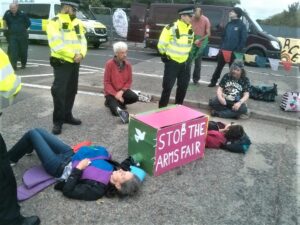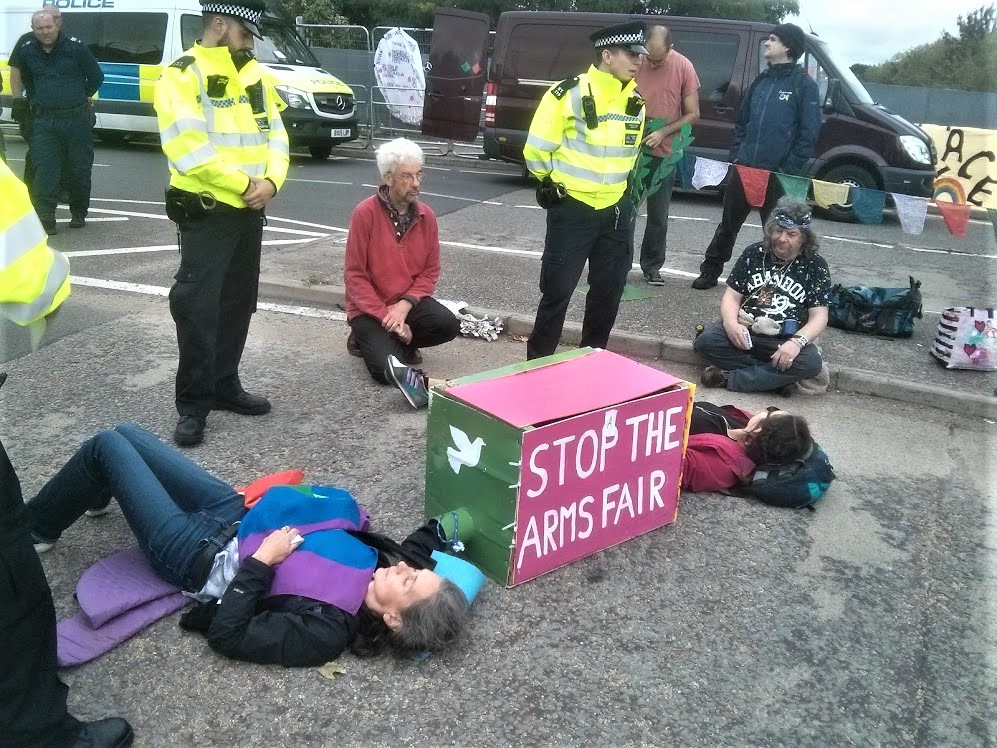
It’s September 2017: on the road outside the Excel centre in East London, protesters have been blocking the roads for days, obstructing the lorries and heavy goods vehicles that are delivering materials for the DSEI arms fair. By the end of a week of protests, over 100 people will have been arrested while trying to prevent the DSEI arms fair from going ahead.
For four of the protesters, their arrest would be the start of a four year legal battle, and one which has significant ramifications for the right to protest. Arrested and charged with “wilful obstruction of a public highway” (contrary to Section 137 of the Highways Act), they scored an inital court victory when a District Judge (DJ) at Stratford Magistrates court acquitted them of their charges in February 2018. DJ Hamilton ruled that although the defendants did deliberately obstruct the highway, but that because they did so in the course of exercising their rights to free speech and assembly (protected by articles 10 and 11 of the Human Rights Act) and therefore had a “lawful excuse”.
But this wasn’t the end of their battle. The Crown Prosecution Service – intent on sending a clear message that future disruptive protests would not be tolerated – appealed to the High Court on a point of the law. The High Court accepted the CPS’ arguments, convicting four of the defendants, handing them each a 12 month conditional discharge and £120 in court costs and fees.
What’s worse, the High Court’s judgement set a precedent that all but guaranteed the conviction and punishment of protestors who blocked roads in the future.
Lawful excuses and the balancing of rights
Section 137 of the Highways Act states that a person is guilty of an offence if they “without lawful authority or excuse, in any way wilfully obstructs the free passage along a highway” (emphasis our own). In other words, one does not violate s137 merely by blocking a highway, but by blocking a highway without having either the proper authority to, or a legitimate reason or excuse for doing so.
The legal meat of the Court of Appeal judgement concerned whether protest could constitute a “lawful excuse”. The view of the District Judge who originally heard the case was that deliberate, physical obstruction of the highway could be a lawful exercise of people’s Article 10 and 11 rights and that, looking at the specific facts of the case, he believed the defendants’ infringement of the rights of road users was much less significant than the infringement to the right to protest that would result from convicting and punishing them for that obstruction. For this reason, he found the defendants not guilty of all charges.
It’s important to note that DJ Hamilton did not judge that the rights of protestors always trump those of road users, rather that the nature and extent of this particular obstruction did not constitute a rights infringement that the law should punish.
The High Court disagreed. In it’s judgement, it maintained that DJ Hamilton did not strike a fair balance “between the rights of the individuals to protest and the general interest of the community, including the rights of other members of the public to pass along the highway. Rather the ability of other members of the public to go about their lawful business was completely prevented by the physical conduct of these Respondents for a significant period of time. That did not strike a fair balance between the different rights and interests at stake” (para 117).
In reaching this conclusion, the High Court effectively ruled that protest cannot constitute a lawful excuse for blocking a highway and that, consequently, a protest does not count as a legitimate exercise of one’s Article 10 and 11 rights if it negatively impacts road users.
Enter the Supreme Court
In June, however, the Supreme Court reversed the High Court decision and the convictions were overturned.
In their appeal, the defendants asked the SC to look at two key questions. The first concerned the specific tests to be applied when a higher court assesses the decision of a trial court in a criminal case which engages European Convention rights. The second – and for our purposes, more interesting – question was: is deliberate physically obstructive conduct by protesters capable of constituting a lawful excuse for the purposes of section 137 of the 1980 Highways Act, even when there is a real impact for other road users? In other words – can obstructing the highway as part of a protest ever be considered lawful?
In answer to the second question, the Court agreed with DJ Hamilton and held that deliberative or obstructive protests, where there is a real impact for other road users, can still be protected by Convention Rights and can be a lawful excuse for the purposes of a charge of wilful obstruction of the Highway.
While in some quarters the ruling has been misreported as “protest is a legal excuse to obstruct the highway”, the ruling is more subtle than that: it states that when considering whether someone is guilty of breaking s137 of the Highways Act, courts should take into consideration a whole range of factors including how big of an obstruction was caused, for how long, and what else was happening around you. Crucially, it means that protesting in a way that obstructs road users isn’t automatically a criminal offence.
Raj Chada, of Hodge Jones & Allen, who represented the protestors, said:
“We are delighted that the Supreme Court has recognised that protests which are deliberately obstructive are still protected under Article 10 and 11 of the European Convention on Human Rights. Disruptive protests can and do change things. From anti-apartheid campaigners stopping sports events to civil rights protestors conducting sit ins, disruption as a form of free speech can be the spark for radical change.
“Whilst the Supreme Court has recognised the importance of free speech, the Government seeks to undermine it by their disgraceful Police and Crime Sentencing Bill. That legislation is an attack on our civil rights and democratic values”
Defending the right to protest:
The Supreme Court decision matters because it sets a precedent for how the police and the courts deal with direct action protests, which seek to use disruptive tactics to achieve their aim. The legal battle being fought is: how far do your protections under the Human Rights Act go? How far does your right to freedom of assembly and freedom of speech extend? And we’re already seeing the effects of this new ruling, as a slew of Extinction Rebellion protesters accused of blocking the highway have their convictions overturned in the wake of this judgement.
This battle has become even more crucial now, as the government seeks to introduce new police powers in the Police, Crime, Sentencing and Courts Bill to clamp down on protests which it deems “noisey”, “disruptive” or “causing serious annoyance”. The Bill, which includes sweeping new police powers to shut down dissent alongside racist legislation targeting Gypsy, Roma and Traveller communities, is a direct response to the governments frustration with direct action protest movements like Black Lives Matter and Extinction Rebellion.
The new Bill explicity seeks to criminlise any protest activity which could cause disruption – which, when you think about it, is most protests. Protest is inherently disruptive. That’s the point of it. The Bill imagines a world where protest is quiet, tidy, non-disruptive, and doesn’t interfere with any business activities. In other words, protest which has no impact on its targets.
That’s why this ruling comes at such a crucial time.
For more information on the legal details of the case, see this handy explainer from Raj at HJA.

